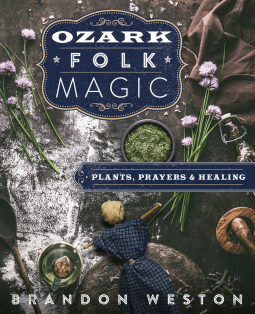Sympathetic bloodroot. [Ozark Folk Magic by Brandon Weston]
Discover the Healing Power of Plants and Prayers
Bring traditional methods of healing and magic into the modern world with this impressive book on Ozark folk magic. Providing lore, verbal charms, healing plants, herbal recipes, magical tools and alignments, and more, folk healer Brandon Weston sheds light on the region's secretive culture and shows you how to heal both yourself and others.
Ozark Folk Magic invites you to experience the hillfolk's magic through the eyes of an authentic practitioner. Learn how to optimize your healing work and spells according to the moon cycles, zodiac signs, and numerology. Explore medicinal uses for native Ozark plants, instructions for healing magical illnesses, and how modern witches can feel at home with Ozark traditions. Combining personal stories and down-to-earth advice, this book makes it easy to incorporate Ozark folk magic into your practice.
Includes a foreword by Virginia Siegel, MA, folk arts coordinator at the University of Arkansas
There are several post-colonial, settler subcultures in the United States. I think when we think of distinct groups that developed away from the mainstream we tend to think of the Cajuns, Arcadians, Appalachians. I'll be honest, I had to learn Google where the Ozarks were. I probably previously would have lumped in under Appalachia. But I think that tendency to immediately draw up pictures of intermingled European ancestry and practices, cultures that have developed so uniquely, I imagine that has a lot to do with a domestic propaganda of the nation-making kind. But I digress, that's another conversation.
I am always interested in learning about different groups of people across the U.S. From how Indigenous people have survived through the centuries, how descendants of stolen people have survived through the centuries, how migrants have survived through the centuries, and how the variety of immigrants have and continue to make their way to survive on this land. The syncretism of new life following uprooting. That's what drew me to Brandon Weston's Ozark Folk Magic.
Generally, honest study of herbalism and other systems of alternative medicines alongside study of allopathic medicine needs to be the norm. From sociological, anthropological, and healthcare perspectives. How can care be optimized if one aspect of input is ignored? Books on herbalism and alternative medicine, specifically of the American variety, tend to be based on Old World systems with light incorporation of native plants. Pleasantly, when applicable, Weston focuses and encourages respectful focus on native plants.
Weston inserts insightful commentary on the forced relocation of Indigenous groups, specifically the Osage, reconciling local histories of lynching, and the shifting framework of a culture of practices at risk of disappearing. Reading, you get the sense of what values are held in the Ozarks and what the day to day might have looked like over the decades. As a book of instruction or a collection of how-tos the book fall short, but that's not really where its value lies. Its value is held in weight as a tool of remembrance, a record of a shifting peoples that make up part of the fabric of the American cultural landscape.
Overall I found it an interesting read. I am now quite aware of sanguinarine. The author did a wonderful job of incorporating scientific research and respecting practices, a plus in books on complementary and alternative medicine for me. I've a new understanding for the Ozarks and the people who live there. 5 stars from me.
Ozark Folk Magic (ISBN: 9780738767253) was published January 2021.

Comments
Post a Comment